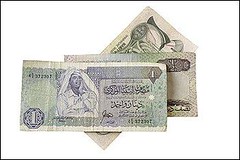
PREV ARTICLE
NEXT ARTICLE
FULL ISSUE
PREV FULL ISSUE
WASHINGTON POST ARTICLE ON NATIONS OUTSOURCING BANKNOTE PRODUCTION
This week The Washington Post published an article about the outsourcing of banknote production, inspired by the news about Britain's impounding of notes produced for Libya.
-Editor
Half the world. Of all bank notes, 10 to 20 percent are printed by private companies, such as the Britain's De La Rue, Canadian Banknote Co., Giesecke & Devrient in Germany, and Crane, a printer working in Sweden and Massachusetts. Of the world's 171 currency-issuing authorities - there are more countries than currencies, because of the European Union and an economic union of West African countries - about 50 percent outsource some portion of their printing. Giesecke & Devrient, for example, prints currency for five dozen countries, and Canadian Banknote fills orders for 20. Many governments don't talk about the practice, and the printing houses refuse to release their client lists. Singapore, Finland, Sweden, Bahrain and Qatar are known to outsource their printing. Controversy erupted in India last year when its outsourcing became public. The Philippines has ordered notes from a broad for years, with mixed results. In 2005, the French company Oberthur misspelled the president's name on some bills. Smaller countries outsource their printing needs for economic and technical reasons. Bank note production is a niche business, and the machines required to make modern currency are expensive and rare. The smallest and cheapest printing systems available can produce a billion notes a year, so if a country needs fewer than that - and many do - they'd be wasting their investment. Some smaller countries choose to keep their printing in-house despite the inefficiency, for national security reasons. (More may do so after Britain's response to Gaddafi.)
To read the complete article, see:
Libya is one of many nations that outsource currency production
(www.washingtonpost.com/wp-dyn/content/article/2011/03/11/AR2011031107663.html)
The Numismatic Bibliomania Society is a non-profit organization promoting numismatic literature. See our web site at coinbooks.org. To submit items for publication in The E-Sylum, write to the Editor at this address: whomren@gmail.com To subscribe go to: https://my.binhost.com/lists/listinfo/esylum All Rights Reserved. NBS Home Page Contact the NBS webmaster 
|
